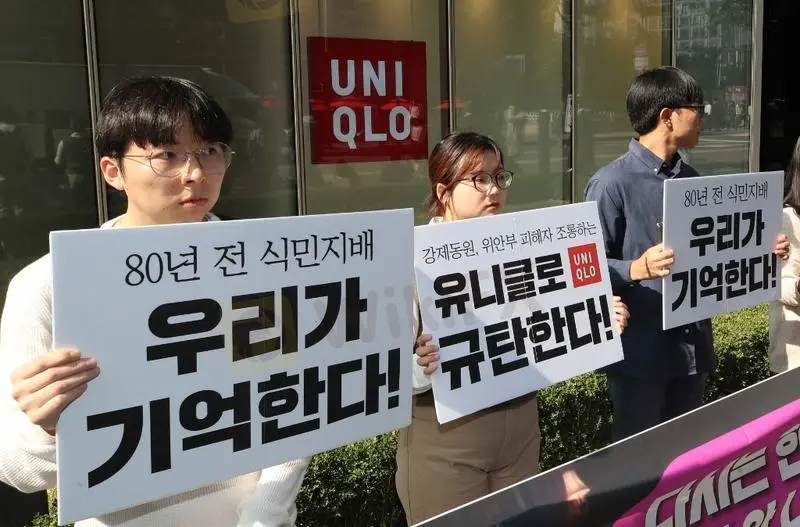简体中文
繁體中文
English
Pусский
日本語
ภาษาไทย
Tiếng Việt
Bahasa Indonesia
Español
हिन्दी
Filippiiniläinen
Français
Deutsch
Português
Türkçe
한국어
العربية
South Korea-Japan dispute flares following Uniqlo ad
Abstract:Japanese clothing brand Uniqlo is facing a backlash by consumers in South Korea after an ad by the company was criticized for mocking victims of Japan's forced labor and brothel workers from Korea in World War II.
Japanese clothing brand Uniqlo is facing a backlash by consumers in South Korea after an ad by the company was criticized for mocking victims of Japan's forced labor and brothel workers from Korea in World War II.

In the commercial, Iris Apfel, 97-year-old American style icon with more than 1.4 million Instagram followers, is in an animated conversation with 12-year-old fashion designer Kheris Rogers. When Rogers asks how she used to dress as a teenager, Apfel says: “I cant remember that far back!” Instead of a literal translation of that line, the commercial aired in South Korea carried subtitles saying: “Gosh! How can I remember something that goes back 80 years?” The company began airing the commercial in South Korea and other markets.
This prompted a South Korean history student to parody the commercial in a 19-second YouTube video that has been watched 101,000 times in two days. In the parody, the student Yoon Dong-hyun stands with Yang Geum-deok, a 90-year-old woman who had been a forced labourer for Japans Mitsubishi during World War Two. Yoon asks how hard it was for Yang when she was young. “It is impossible to ever forget that awfully painful memory,” she replies. Yoon has now posted the video with subtitles in English and Japanese.
As the outcry against the commercial grew, student protesters took to the street demanding an official apology from Uniqlo. Bang Seulkichan, 22, was among those picketing a Uniqlo store in Seoul, holding a sign reading: “Colonial rule 80 years ago – we remember!”
Uniqlo, owned by Japan‘s Fast Retailing Co Ltd’s, pulled the ad in South Korea. “There was no intention to touch on the issue of comfort women or South Korea-Japan dispute,” a Uniqlo official in Seoul told Reuters, asking not to be named because of the sensitivity of the situation.
Relations between the two countries have slumped to their lowest in decades after a ruling by South Koreas top court last year ordering Japanese firms to compensate wartime forced laborers. In July, Japan reciprocated by tightening controls on exports of three key chipmaking materials to South Korea, prompting a wide-ranging boycott of Japanese products ranging from beer to pens.
South Korea and Japan share a bitter history dating to the Japanese colonisation of the Korean peninsula from 1910 to 1945, including the use of comfort women, a euphemism for girls and women, many of them Korean, forced to work in its wartime brothels.
Disclaimer:
The views in this article only represent the author's personal views, and do not constitute investment advice on this platform. This platform does not guarantee the accuracy, completeness and timeliness of the information in the article, and will not be liable for any loss caused by the use of or reliance on the information in the article.
WikiFX Broker
Latest News
The Withdrawal Trap: How Scam Brokers Lure Victims into Paying More
FCA to Investors: Think Twice Before Trusting These Brokers
Trump\s tariffs: How could they affect the UK and your money
Trump gambles it all on global tariffs he\s wanted for decades
TradingView Brings Live Market Charts to Telegram Users with New Mini App
Trump tariffs: How will India navigate a world on the brink of a trade war?
IG Group Acquires Freetrade for £160M to Expand UK Investment Market
U.S. March ISM Manufacturing PMI Released
Should You Beware of Forex Trading Gurus?
Exposed by SC: The Latest Investment Scams Targeting Malaysian Investors
Currency Calculator







